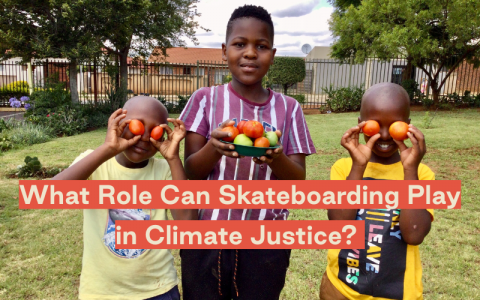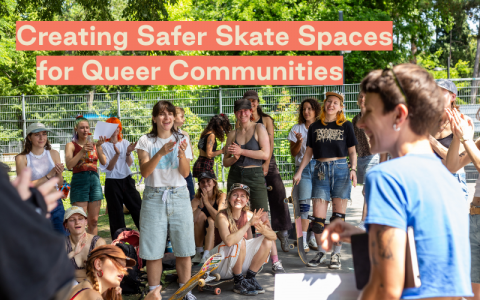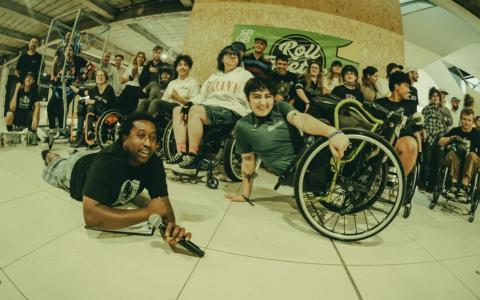One of the main goals we had this year for the Goodpush Alliance was to bring as many skateboarding-for-good initiatives as possible together in the same space. So much of our work and our lives these days happens online, on our phones and computers, which is fantastic for allowing us to access resources and connect with others around the world, but is never quite the same as face-to-face meetings.
So this year we held two Goodpush events – one in Copenhagen and one in South Africa – which brought together nearly 100 people from more than 50 different skateboarding initiatives worldwide to share knowledge and build connections!
One clear takeaway from the Goodpush events is that we are an enormously passionate, knowledgeable and motivated group working incredibly hard to change people’s lives for the better. By sharing resources, solutions and ideas we can move ahead on addressing some of our biggest challenges, and collaborate to support each other’s work.
Below is a recap and photos on each event. We hope these are just the first of many Goodpush events to come!
Goodpush Meeting in Copenhagen
We held our first-ever Goodpush Alliance meeting the day after the incredibly inspiring Pushing Boarders conference in August, with over 60 people representing 38 social skateboarding organizations in attendance. This one-day event was held in the legendary Alis Wonderland bowl in Christiania, Denmark (who graciously provided us with free use of the space!).
The meeting involved workshops and discussion around our goals, challenges and how we achieve the impact we want to have in the very different communities we work in worldwide. We also talked about gaps: in our knowledge, in mental health supports, in resources for paying staff, and in how our projects can take into account environmental sustainability.
Common Goals?
The first workshop of the day was about the goals that each of our social skate projects have, and whether there might be any larger goal that we all have in common. Some potential benefits of identifying and working towards a common big picture goal were brainstormed, including:
- Supporting each other
- Holding each other accountable
- Sharing experiences and knowledge
- Sharing the load through partnerships
- Sharing materials, tools and resources
Later in the day we discussed the basics of logic models and how these can help us plan programs and seek out funding. We also decided to develop a shared big picture logic model for social skateboarding, with several organizations signing on to co-create a first draft together with Skateistan/Goodpush in the near future.
Challenges and Solutions
It’s rare for grassroots social projects to have the time and space to reflect openly about the challenges and difficulties they are facing. It’s even more rare to have people around who understand and who have had similar experiences.
This topic was kicked off with a presentation by Skateistan South Africa Educator, Wendy Ngwenya, about past and ongoing challenges related to running Skateistan programs in Johannesburg. Then the attendees worked in groups to brainstorm challenges and discuss potential solutions.
Some of the key challenges mentioned were:
- Sustainable funding
- Human resources (Reliable/available volunteers/teachers, skills gap, low pay for staff, finding leaders within community)
- Burn out
- Lack of facilities (ie. indoor skate space, workshop space)
- Getting skateboarding equipment
- Lack of inclusiveness & diversity (among both participants and staff/volunteers)
- Measuring (long-term) impact
Many solutions involved collaboration, whether it was sharing our resources, pursuing partnerships, or asking for help. There was also a very important and simple reminder for dealing with challenges:
How Skateboarding Can Help Heal Trauma
We were also honoured to have Joel Pippus from Hull Services (in Canada) as a guest speaker, presenting on his work and research around the brain, emotional trauma, and skateboarding’s ability to heal the brain from trauma. His presentation built off of the short documentary released in 2018, Push to Heal, which explains the concepts in detail.
Joel shared the below infographic he developed, showing how each level of brain development can benefit from skateboarding. There are four levels of the brain:
- Brainstem - sensory;
- Diencephalon - pattern/repetition behaviour;
- Limbic system - relational skills;
- Neocortex - cognitive (ie. tricks/complex skills).
Here are three of the most powerful takeaways from his presentation
-
The Neurosequential Model (NM) lens legitimizes what we inherently knew but couldn't explain: that skateboarding is healing and can literally save lives.
-
The main factor in determining the outcome of therapy is the relationship between the staff and the person. It’s not so much “what you do” but how you do it. Just being there and building a strong relationship is already a huge help for children affected by trauma.
-
Skateboarding is defined by the DIY mentality which is an area of strength for skateboarders but also presents a risk because it can create a stigma against asking for help when we need it.
For a detailed summary on the Goodpush Copenhagen meeting, click here.
Goodpush Summit in Johannesburg
In early October the team at Skateistan South Africa hosted the very first Goodpush Summit, bringing together around 35 people working in social skate projects worldwide. The Summit featured four days of workshops, presentations, discussion and skating, with 25 visiting participants coming from:
- Zimbabwe
- Angola
- Zambia
- Mozambique
- Bangladesh
- USA
- Greece
- and all over South Africa!
The Workshops
The Summit kicked off with presentations by all the projects that attended, demonstrating an amazing diversity of contexts and approaches based on the same underlying love of skateboarding. We heard about Bangladesh Street Kids Aid’s work with homeless children in Dhaka, the regular skate sessions in the streets of Zimbabwe, the activation of Angola’s recently built skatepark, the plans for building Mozambique’s first concrete park, and the growing girls’ program at Indigo Youth Movement – as well as from many other leading and emerging skate projects. The presentations were followed by a lunch skate tour through the streets of central Johannesburg.
The rest of the week then featured workshops on Child Protection, Youth Leadership, Measuring Impact, Community Engagement, Skate Lessons and Games, Organizational Capacity, and Inclusion, with tons of sharing, learning and inspiration along the way. Everyone contributed tips and tricks (literally) – with our daily skate sessions seeing first drop-ins, first tre flips and everything in between!
Social Skate and the SDGs
We also built off the inputs from the Goodpush Meeting in Copenhagen through discussions around common goals and challenges. Between the two Goodpush events we gathered input from 35 different social skate organizations on which of the UN Sustainable Development Goals (SDGs) are their top priority (graph below).
The Community
The best part of the week was seeing the strong relationships being built between people and projects. For some of the younger attendees, this was their first time traveling to another country or skating at a skatepark! Two other attendees had already been in touch for three years via Whatsapp and Facebook, and got to meet in person for the very first time.
Although Skateistan aims to have equal gender representation in all programs, in the end the majority of non-Skateistan participants were men, however it was super encouraging to see how much support there was from all of these projects for getting more girls on boards. With a bit more time and continued focus on inclusion of all genders and abilities, we can make skateboarding an example for the rest of the world to follow.
Special Session on Mental Health in Social Skateboarding
The final session of the Summit was purposely left empty, to give the attendees a chance to choose what topic they wanted to discuss all together. They decided they wanted to do it on mental health – specifically for the staff and volunteers of skate projects. We divided the topic into three areas for discussion and brainstorming:
- Factors that contribute to stress/burnout
- Needs within social skateboarding to improve wellbeing
- Resources that we already have which can be built upon
(click here for a full summary on this workshop)
A big thanks to the fantastic team at Skateistan South Africa for hosting and facilitating the Goodpush Summit and to our attendees for bringing their passion, energy and ideas!
VIDEO: Watch a 2-minute recap of the 2019 Goodpush Summit below, made by attendees Shred.Co.


